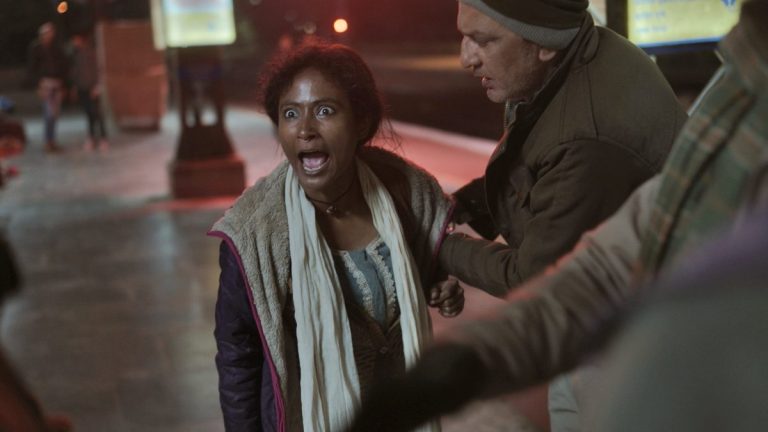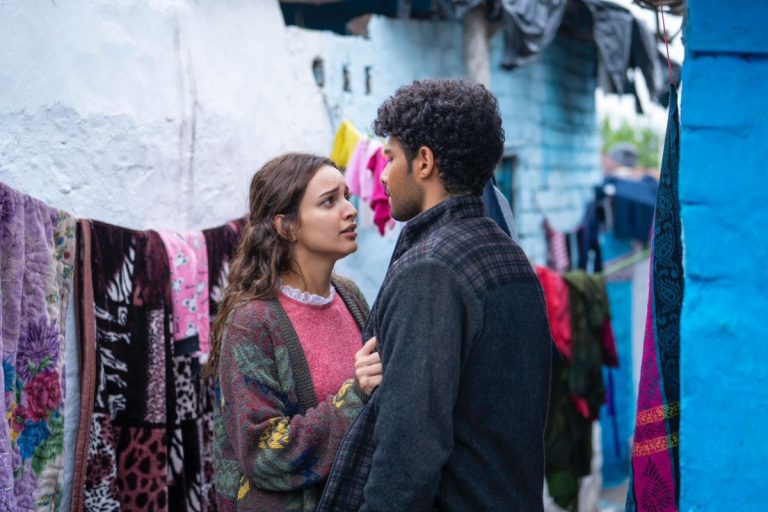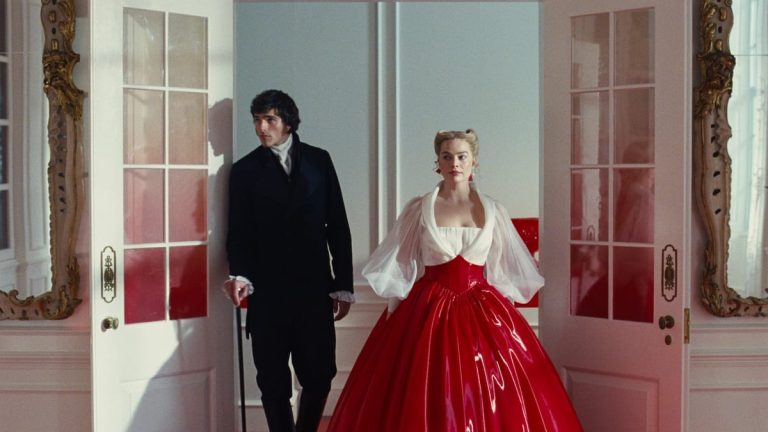In the days leading up to the 2008 Beijing Olympics—a moment of historic pride for China—Guan Hu’s “Black Dog” finds its voice not in the bustling stadiums or glowing city skylines, but in the emptied-out outskirts of Chixia, a rural town gutted by redevelopment. The film, which won the Un Certain Regard Prize at the 2024 Cannes Film Festival, is now streaming on Prime Video India, and it is a quietly devastating meditation on alienation, urbanisation, and the delicate thread of trust between a man and a dog, both cast aside by society.
At the heart of the film is Lang, played with aching restraint by Eddie Peng, a former motorcyclist at the local circus and once a celebrity in his town. When Lang returns home after years in prison—paroled early for good behaviour—he finds a place that has changed beyond recognition. His home is still there, but the soul of the place, its people, its rhythm, have either been bulldozed or moved to the cities in search of better economic prospects. Their pets, once companions, now roam the outskirts as strays. These dogs, abandoned not by cruelty but by circumstance, form the emotional and thematic backdrop of “Black Dog.”
Redemption Without Sentimentality
Lang is a man haunted not just by the crime he committed, but by the persistent gaze of a society that cannot forgive. The relatives of the boy he killed want revenge. But Lang, shaped and subdued by his time in prison, reacts not with aggression but with empathy. He carries a quiet patience, an almost Buddhist understanding of consequence. In his interactions with Butcher Hu, the boy’s uncle, he absorbs the hatred without retaliation. Lang understands grief because he himself lives with it, and the film is unflinching in how it portrays redemption, not as a dramatic transformation, but as endurance.
The bond between Lang and the titular “Black Dog” emerges gradually. Initially, the dog is presented as a threat—city-wide announcements warn residents about its dangerous, possibly rabid nature. Lang is assigned to a dog-catching squad tasked with “cleaning up” the streets ahead of the Olympics. Stray dogs, the squad is told, are bad for business. “If you’re a businessman and you come down here, would it be pleasant if you see so many strays around?” the officer asks. “What if one bit you?”
This logic—capitalism over compassion—is not lost on the film. When Lang first encounters the Black Dog, it attacks him. Twice. But something flickers between them: recognition. The dog, like Lang, is feared, misunderstood, and labelled dangerous. Their relationship deepens wordlessly. Lang whistles; the dog understands. Lang looks; the dog knows what to do. In this relationship lies the film’s aching soul: two beings, scorned by society, find solace in each other.
The Ghost Town Olympics
Set in 2008, the film uses the upcoming Olympic Games as a brilliant and ironic contrast. The Olympic torch burns in Beijing, while towns like Chixia are being bulldozed. In one of the film’s most biting juxtapositions, announcements promoting the once-in-a-century solar eclipse, meant to awe and distract, play over images of economic decay, mass demolitions, and deserted homes. Guan Hu suggests that modern China, in its pursuit of global legitimacy, is willing to sacrifice its roots, its animals, and its people.
This theme is not confined to the stray dogs. Lang’s sister, heard only over phone calls, constantly discusses the compensation money she hopes to receive from the demolition of their paternal home. Lang’s father, a longtime zoo caretaker, reveals the brutal efficiency of cost-cutting when he admits they had to let the wolf go: “Couldn’t afford to feed it.” Even human dreams are downsized. Lang’s old friend, once a guitarist, now cooks at a food stall. “Why don’t you play anymore?” Lang asks. The reply: “Who plays these days?”
Of Fathers and Final Acts
Another major theme that gradually surfaces is Lang’s strained relationship with his alcoholic father. His father, once the quiet keeper of the zoo, is now on a slow spiral towards death—his body breaking down under the weight of years of drinking. When hospitalized, he quietly requests that Lang turn off the ventilator, signalling not only a lack of will to live but also a grim acceptance of fate. The film doesn’t rush this moment—it lets it sit, lets it ache.
What makes this thread even more heartbreaking is how it dovetails with the death of the Black Dog. After losing the animal that had brought him rare comfort and companionship, Lang performs a final ritual for his father. In a haunting, poetic gesture, he touches his father’s lips with the very drink that brought him ruin, drinks a cupful himself, and then unplugs the oxygen line. Finally, he rests his head on his father’s chest—the only time in the film we see him get physically close to him. It is an act of both mercy and mourning.
It’s here that the film’s emotional maturity is clearest: the suffering of the dog helps Lang comprehend the suffering of his father. There’s a merging of human and animal grief, a blending of silent bonds that transcend species or speech. This ability to translate feeling across lifeforms is where “Black Dog” achieves something rare.
A Bond Beyond Words

Lang never names the Black Dog. Their communication is visual, visceral. When Lang whistles, the dog appears. When Lang sets it loose, it hunts for him. In this relationship lies the film’s aching soul. Despite a brief and tender flirtation with Grape, a cheerful woman played with charm by Tong Liya, Lang holds back. His sense of guilt, or perhaps his understanding of impermanence, prevents him from reaching out. Only with the dog does he fully surrender to companionship. This relationship is made all the more poignant by what we know off-screen: the dog who played the titular role won the Palme Dog Award at Cannes, and Eddie Peng eventually adopted him after filming, unable to part from the animal who had become, quite literally, a co-star.
A Vanishing World, Captured Still
Visually, the film is stunning. Guan Hu and his cinematographer lean into still framing, long takes, and abandoned landscapes. There is a raw quietness to Chixia—like a town already forgotten, left in limbo between erasure and memory. The pacing is slow but deliberate. Scenes unfold in real time. There is no need to rush. Time in Chixia has no urgency. Guan Hu has spoken in interviews about how the dog was not treated as an animal in the story, but as a character with its own arc. This approach becomes apparent in how the camera often lingers on the dog with as much reverence and narrative interest as it does on Lang.
Pink Floyd and the Deserted Parade
In the film’s final stretch, Guan Hu introduces an unexpected but effective musical element: two Pink Floyd songs—“Hey You” and “Mother.” It is the use of “Mother” that truly stands out. Played over a surreal, almost dreamlike scene where the remaining townsfolk and stray animals gather to witness the solar eclipse, the song’s themes of overprotection, repression, and emotional manipulation bleed into the film’s critique of state control. Zoo animals are released into the streets—a tiger prowls past abandoned stalls, goats trot over sand-covered roads.
It is a moment of chaos, but also liberation. By equating the state with a controlling, overbearing mother, Guan Hu aligns the song’s psychological concerns with the film’s socio-political ones. The citizens are treated like children, too untrustworthy to manage their own destinies, too expendable to be remembered once relocated.
A New Beginning
In the film’s quietly redemptive final image, Lang is no longer walking alone. We see him racing his motorcycle through the desolate, windy terrain, leaving Chixia behind. But this time, he carries a puppy, the offspring of the Black Dog, nestled in his bag. The past may be buried, but something tender lives on. The film doesn’t end with finality. Instead, it leaves us with a cautious kind of hope—one that’s not loud or grand, but quietly, unmistakably real.







